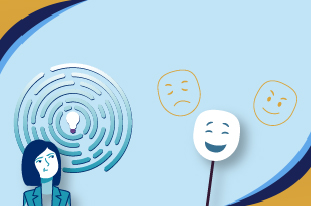If you are one of the affected individuals who have OCD then you have probably wondered at some point in your life that your OCD thoughts are not real but very much seem real. We’ll help you understand the difference between what is real and what is not when it comes to OCD after going through some of the basics that also relate to the ailment of OCD. Let’s begin:
What is OCD?
OCD or Obsessive Compulsive Disorder, is a mental condition that is characterized by obsessive thoughts and the ritualistic behavior that follows these thoughts. Why do OCD sufferers perform repetitive actions? Well, these actions are performed by OCD sufferers to get rid of the intrusive thoughts which are not real in every sense of the way as they think these actions do indeed get rid of these thoughts.
These obsessions tend to revolve around these contexts:
- Worry that you might deliberately or accidentally hurt someone you love
- Fear of contamination or bacteria
- Worry about forgetfulness that might lead to something consequential
- Excessive worry of losing control and impulsivity
- Unwanted thoughts that involve sex, religion, or harm
The obsessions described above lead to ritualistic behavior that leads to compulsions like these:
- Excessive checking
- Washing and Cleaning
- Repeating actions e.g. body movements
- Mental reviews and canceling e.g. of words
- Obsessively rearranging everything symmetrically
- Asking for reassurances from friends and family members
- Avoiding situations that might trigger obsessions
So, Are Your Intrusive Thoughts Not Real?
Yes. Your OCD thoughts are not real but they will always seem real to you. That is why you always try to perform ritualistic actions that you think will help get rid of these intrusive thoughts. Inherently, it is not a “thought” problem but essentially a “feeling” problem as affected individuals, which in this case are you, might “feel” these obsessions are real due to two additional reasons: the triggers and the feared story, even if you think your OCD thoughts are not real.
There is a common misconception about OCD that these unwanted thoughts are the root of the problem and getting rid of them by diving head-first into compulsions will restore the normalcy that OCD sufferers long for. But this isn’t the case.
Triggers
The triggers, basically the neural associations that you have with the feared story that your mind cooked up, are usually neutral. What is a hammer? It is an object that is used to pin the nail for some handy work that you might do. But your mind high on OCD might think: It can be used to hurt someone. Here, you are giving the hammer a negative association. Inherently, by giving the hammer an exaggerated negative association, you have created a strong predisposition to create a feared story around it.

The Feared Story
Coming back to the hammer, which is an object and something neutral is given a negative association, therefore creating a trigger. Your OCD mind thought, “Oh, that hammer is dangerously blunt and can be used to hurt someone, ”. The same OCD and the brain of yours that is high on it can also easily create a feared story around it by creating a common obsession, which basically says, “Damn, what if I end up using this hammer to hurt someone I hold dear”.
The Actual Culprit: The Feeling
Blaming the triggers and the feared story is not the way to go as the actual mastermind behind your OCD is the feeling you get when a certain trigger creates a feared story in your brain. Even, as an individual affected you are capable of recognizing whether your OCD thoughts are not real or real. Your brain will know if something is indeed irrational in your thought process.
For example, you know that you love children and will never do anything to harm but compared that people who have a rare form of OCD called the Pedophile OCD will think the same thing but also might obsessively think they might get attracted to those children. This evidence shows that people who have OCD do indeed know how to differentiate if something is irrational or rational in their thought processes. But the “feeling” they get over these thoughts is elevated compared to people who have no OCD and the brain they have is normal. It is basically an inconsistent and highly exaggerated emotional response to something that might not deserve that kind of response. This is the anxiety we feel around a certain feared story. While some form of anxiety is admissible to people with OCD’s false feelings, anxiety, the feeling that makes you jumpy and your heart racing are exaggerated. These feelings of anxiety can also co-occur with anger, impulsivity, sadness, loneliness, and emptiness.
Suppression Will Only Backfire
One might think that suppression of thoughts can help but they will be wrong entirely. Take, for example, someone who fears that something bad is about to happen may try to monitor every situation that they are in closely. This monitoring and reviewing of thoughts can easily turn into hypervigilance, so to stop that the affected individual might try to suppress the intrusive thoughts that something dangerous might happen. Studies suggest that it is a bad idea because suppression of these thoughts will only lead to more intrusive thoughts, you know something that will come back with a bang.
OCD’s deception to you is rooted in the idea that you will consistently and constantly analyze the content of your thoughts instead of considering what these thoughts actually are. Whether your OCD thoughts are not real or real is not the question, but how you deal with these thoughts is the real question. So, instead of suppressing these thoughts, it is better to understand that these thoughts are trying to control you. Once you understand that you will easily be able to resist the compulsion that comes as a result of the obsessive thoughts. This is not the same thing as suppressing the thoughts as here you are resisting a compulsion that comes as a result of a negative thought which is very much well underway. Gradually you will be able to resist the temptation to perform a compulsion and therefore those obsessions of yours will also slowly lose power over you.
Treatment:
The Exposure And Response Therapy
A specific kind of psychotherapy called Exposure and Response Therapy (ERT) is the most suitable form of treatment that can be taken advantage of for an ailment like OCD. It is because this is the very thing that can help you decrease the power of negative triggers that are synonymous with OCD.
Exposure and Response Therapy is a type of Cognitive Behavioral Therapy (CBT) that is used by mental health professionals to help mental health patients come to terms with the negative thought processes that lead to problematic behavior and find resolutions for them. In an ERT, this can be done by exposing the patient to the triggers themselves and making them understand that these negative feelings they get are out of their control, and by only facing them they can get rid of them instead of practicing compulsions for these thoughts. This can also work for a rare form of OCD called Pure OCD (pOCD), which is OCD with just thoughts and obsessions as part of the ailment and no compulsions. Additionally, you will also stop wondering if your OCD thoughts are not real or are indeed real.
Medication
It is generally better to get therapy as the medication is an afterthought because it should only be used during the absence of therapy or to complement that therapy. Usually, antidepressants called Selective Serotonin Reuptake Inhibitors (SSRI) are used to treat OCD, even OCD with just thoughts. While it is not known how exactly SSRI does this as it can take care of chemical imbalances in the brain, in that same way it can also take care of the OCD spikes that occur in the brain.
Conclusion
If you have been wondering for a long time that your OCD thoughts are not real, you now probably know the difference and the answer to the question. Your mind, even when high on OCD, can still differentiate between what is irrational and what is not. The real culprit behind OCD is the feeling of anxiety that makes your life abnormal. Luckily, our expert team at Orange Coast Psychiatry can make a lot of difference by providing you with the best and the most suitable mental health help for treating your OCD. We also provide mental health assistance for mental health conditions such as Anxiety, Depression, or Attention-Deficit/Hyperactivity Disorder (ADHD). Be sure to check our website and book an appointment for the initial consultation.


















